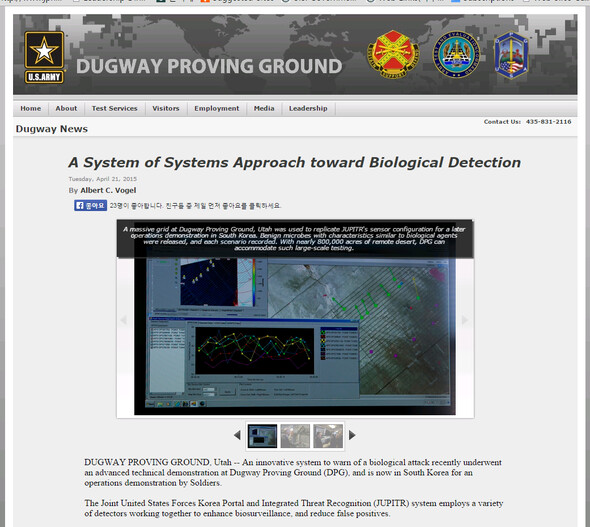hankyoreh
Links to other country sites 다른 나라 사이트 링크
USFK planned experiments to detect airborne benign microbes

US forces in South Korea were planning to carry out an experiment to detect benign microbes that had been released into the air, according to one analyst. Benign microbes are symbiotic microorganisms that live inside the human body, but some want the US military to make clear whether it had plans to move on to outside experiments with anthrax and other deadly pathogens.
The US military’s plans to hold outside experiments were brought up by Kim Hyeong-seong, chief of policy for the Korean Federation of Medical Groups for Health Rights (KFHR), during a debate in the National Assembly on June 30 about dealing with the issue of anthrax that the US military brought to South Korea.
“We really need to make sure that the US wasn’t also planning to use inactive anthrax in the outside experiments with benign microbes,” Kim said.
Kim drew attention to an article published by the US military on the website of the Dugway Proving Ground (DPG) in Utah on Apr. 16. “Recently, at one of DPG’s massive outdoor test grids, JUPITR‘s sensors were set in an array identical to the South Korea configuration. Benign microbes with characteristics similar to biological agents were released in varying scenarios, simulating biological attacks. Each scenario was electronically recorded, for playback at the South Korea operations demonstration,” the article said.
Benign microbes are microorganisms like colon bacillus that live inside the human body and have a symbiotic relationship with humans instead of causing disease.
http://www.dugway.army.mil/NewsArticle.aspx?articleId=/PAO/Articles/2015/04/JUPITR%20FINAL.htm
“Just as it did in the US, the US military was also planning to release benign microbes, which are harmless to the human body, in the air in South Korea and carry out an experiment to see if it could detect these with the AED environmental detectors that are part of the JUPITR Program (Joint USFK Portal and Integrated Threat Recognition),” Kim said.
Kim argues that, since it is not inconceivable that the US meant to later carry out outside experiments with anthrax and other toxic agents in an inactive state, South Korea needs to confirm whether this was actually the case.
The debate on Tuesday was jointly organized by the Civic Society Committee Denouncing the Illegal Shipment of Anthrax, Rep. Kwon Eun-hui and Rep. Choi Jae-cheon with the New Politics Alliance for Democracy, and Rep. Seo Gi-ho with the Justice Party,
“There are still unanswered questions about whether this was really the US military’s first experiment with anthrax, whether experiments were also carried out at other bases in addition to Osan, and whether the US brought in other biological agents along with anthrax,” said Lee Mi-hyeon, head of the Peace and Disarmament Center with People’s Solidarity for Participatory Democracy, during the debate.
“The South Korean government needs to transparently release the findings of the joint US-South Korea investigation and to carefully examine a number of allegations.”
“By shipping anthrax to South Korea, the US appears to have violated the Biological Weapons Convention, which is an international agreement. The only way that the US and South Korea can tighten international restrictions on North Korea is by faithfully complying with this agreement,” said Jung Uk-sik, president of the Peace Network.
By Kim Ji-hoon, staff reporter
Please direct questions or comments to [english@hani.co.kr]

Editorial・opinion
![[Column] Has Korea, too, crossed the Rubicon on China? [Column] Has Korea, too, crossed the Rubicon on China?](https://flexible.img.hani.co.kr/flexible/normal/500/300/imgdb/original/2024/0419/9317135153409185.jpg) [Column] Has Korea, too, crossed the Rubicon on China?
[Column] Has Korea, too, crossed the Rubicon on China?![[Correspondent’s column] In Japan’s alliance with US, echoes of its past alliances with UK [Correspondent’s column] In Japan’s alliance with US, echoes of its past alliances with UK](https://flexible.img.hani.co.kr/flexible/normal/500/300/imgdb/original/2024/0419/2317135166563519.jpg) [Correspondent’s column] In Japan’s alliance with US, echoes of its past alliances with UK
[Correspondent’s column] In Japan’s alliance with US, echoes of its past alliances with UK- [Editorial] Does Yoon think the Korean public is wrong?
- [Editorial] As it bolsters its alliance with US, Japan must be accountable for past
- [Guest essay] Amending the Constitution is Yoon’s key to leaving office in public’s good graces
- [Editorial] 10 years on, lessons of Sewol tragedy must never be forgotten
- [Column] A death blow to Korea’s prosecutor politics
- [Correspondent’s column] The US and the end of Japanese pacifism
- [Guest essay] How Korea turned its trainee doctors into monsters
- [Guest essay] As someone who helped forge Seoul-Moscow ties, their status today troubles me
Most viewed articles
- 1[Column] The clock is ticking for Korea’s first lady
- 2After 2 months of delayed, denied medical care, Koreans worry worst may be yet to come
- 3[Column] Has Korea, too, crossed the Rubicon on China?
- 4US overtakes China as Korea’s top export market, prompting trade sanction jitters
- 5[Editorial] When the choice is kids or career, Korea will never overcome birth rate woes
- 6[Correspondent’s column] In Japan’s alliance with US, echoes of its past alliances with UK
- 7[Photo] Smile ambassador, you’re on camera
- 8Hong Se-hwa, voice for tolerance whose memoir of exile touched a chord, dies at 76
- 9Nearly 1 in 5 N. Korean defectors say they regret coming to S. Korea
- 10Strong dollar isn’t all that’s pushing won exchange rate into to 1,400 range